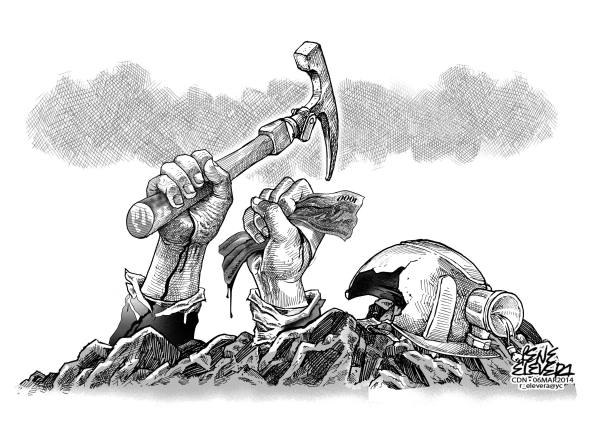The death of 22-year-old coal miner Melvin Landero of Danao City illustrates familiar hazards of small-scale mining where safety standards and work conditions remain below par.
One of the miners, in an interview, described their harrowing work routine. They had to make their way through total darkness with only a flashlight attached to one’s helmet as solitary illumination.
The men were hired on “pakyaw” basis, meaning they were paid for the volume of their production with no benefits of full-time employees.
Generations of coal miners in Cebu have worked that way with primitive means and little protection in unstable tunnels scattered in the province, giving rise to the term “camote mining.’
Cebu, historically, “has always been the main source of Philippine coal production”, according to an international study in 1982 but “it has been characterized by a very crude mining technology.”
Danao City knows this particularly well.
In the 1999 book of John Thayer Sidel of Stanford University “Bossissim in the Philppines”, one chapter on dynasties in Cebu traces the business enterprises on which local elites grew their fortunes.
“The introduction and expansion of coal mining in Danao in the 1930s, 1940s and 1950s… prefigured the emergence and entrenchment of congressman Durano…” (This was referring to the late congressman Ramon Durano Sr., father of the current mayor of Danao, Ramon Durano III.)
Last weeek’s mining accident involved local hires sub-contracted by a private operator Ski Energy Resources Inc. (SERI).
Mayor Durano, who arrived at the premises of the collapsed tunnel, said the company had disregarded safety regulations and was implementing “pakyaw” mining.
The burden now falls on SERI to prove that it had observed due diligence in conducting its enterprise.
Does the legacy of “camote mining” continue to place at great risk the lives of desperate Cebuanos who eke out a living digging in the bowels of the earth?
That tragic Saturday, Landero managed to warn some of his coworkers that the roof of the main shaft was about to collapse. He was caught in the cave-in that led to his death.
The Danao City Council is set to investigate the incident with the Department of Energy, but we wonder if the Landero family will get justice beyond token compensation for the funeral rites.
Mine operator SERI was ordered to stop operations by the DOE. The firm’s initial refusal to allow the entry of a DOE inspection team certainly raises questions about how it conducts its business.
Rep. Ace Durano of Cebu’s 5th district and his father who sits as Danao City mayor are in a position to do something to remedy this sad state of affairs.
The backbreaking labor of coal miners provides the cheapest, avalable source of fuel for boilers, furnaces and power plants. We don’t need more victims like Landero to ensure this supply.
Disclaimer: The comments uploaded on this site do not necessarily represent or reflect the views of management and owner of Cebudailynews. We reserve the right to exclude comments that we deem to be inconsistent with our editorial standards.

